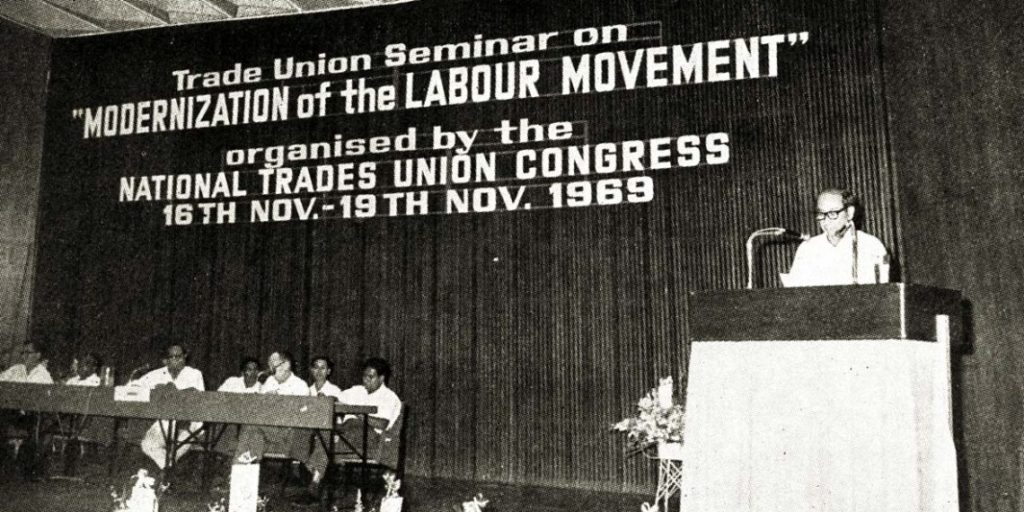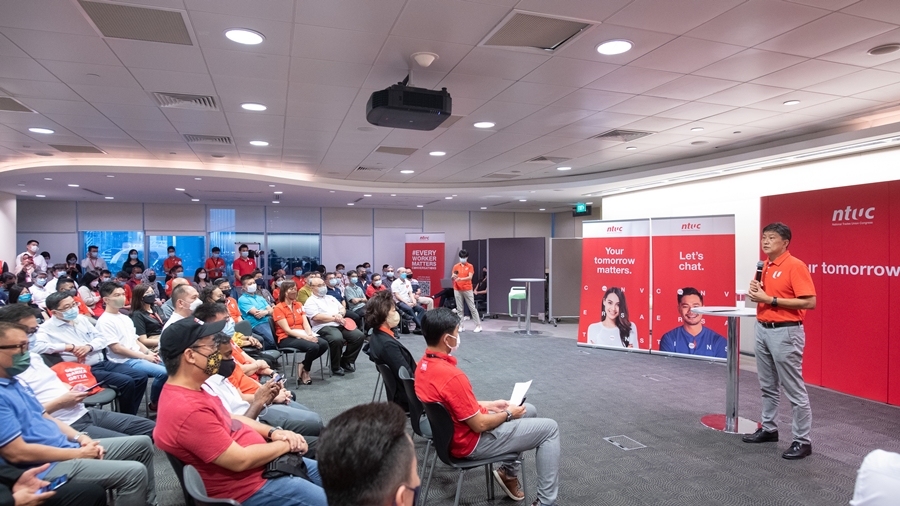By Winston Ng
Since 1961, NTUC has championed the interests of workers and collaborated with tripartite partners — employers, the Government, and unions to ensure Singapore has strong employment, business prospects and a prosperous economy for the nation.
In 1967, the British announced they would withdraw their forces from Singapore by 1971. This was earth-shattering as at least 21,000 workers might lose their jobs, and gross domestic product (GDP) may decline as much as 14 per cent.
After the announcement, the Government introduced the Employment Act to link wages to efficiency and productivity. It amended the Industrial Relations Act as well to clarify and make a clear distinction between management functions and trade union functions. As a result, trade unions gave up power over recruitment, transfers, promotions, dismissals, or retrenchment as they became sole-management powers.
These changes reduced the power of trade unions and, therefore, the NTUC. The trade unions were left occupied with wages, other benefits and some aspects of work conditions and employment.

By 1969, union membership had declined from 120,000 in 1965 to 90,000. Workers felt trade unions were no longer relevant because of the legislative changes. The same year, NTUC organised the “Modernisation Seminar” to revive the Labour Movement.
Although titled a ‘seminar,’ attendees described the event as akin to an exercise involving deep soul-searching. The late CV Devan Nair, the adviser of NTUC then, chaired the seminar and emphasised in his speech that a modernised society requires a modernised Labour Movement. The Labour Movement must go beyond just a bargaining institution.
NTUC then reinvented itself, establishing social enterprises that were key to workers’ lives — such as education and housing, consumers and producers’ co-operatives and financial assistance. NTUC FairPrice, NTUC Income, and My First Skool are examples of how NTUC is helping workers manage their cost of living while representing their interests as workers in Singapore’s economy.
At the end of the seminar, the Labour Movement put forward 14 recommendations as part of a strategic plan. The most important recommendation was the Labour Movement’s acceptance of total responsibility, co-equally with the Government and management for the economic survival of Singapore, and the establishment of co-operatives. A new workers’ compact was hence shaped as the seminar concluded.
You can read up on more of the Labour Movement’s history on this site: https://ms50.ntuc.org.sg/
Present: Expanding Representation
In recent years, even before Covid-19 wreaked havoc on our lives and livelihoods, NTUC has kept pace with the shift of workforce profiles and Singapore’s economic agenda. New associations representing PMEs, taxi drivers, freelancers, content creators and platform workers were created. Heavy investments went into training and placement through over 1,000 Company Training Committees (CTCs) and NTUC’s e2i (Employment and Employability Institute).
Forward Singapore Exercise
One of the six pillars of the year-long Forward Singapore exercise is EMPOWER. It is led by NTUC Secretary-General Ng Chee Meng and Manpower Minister Tan See Leng, and Senior Minister of State for Manpower Koh Poh Koon.
Forward Singapore will produce a set of policy recommendations by mid-2023 to highlight how segments of Singapore society can contribute toward shared goals.
#EveryWorkerMatters Conversations
NTUC has also launched its #EveryWorkerMatters Conversations (EWMC) on 11 August 2022. EWMC aims to reach at least 20,000 working people in Singapore, regardless of age, collars, and sector, to listen to their concerns, priorities, and aspirations on work to find out how NTUC can refresh the compact with workers.

Using these voices from the ground, NTUC can then better examine how unions, associations and its social enterprises can evolve to meet the needs of a new generation and future Singaporeans. In particular, NTUC wants to understand the key enablers to help workers succeed in their careers, the assurances workers need as they progress through different life stages, and the protections that are necessary for vulnerable workers.
Doing more, Doing Together
In the #EveryWorkerMatters Conversations, NTUC calls for all the working people in Singapore to actively seed their views and ideas to flesh out Singapore’s desired future of work. It can only be possible if every worker does their part. In the discussions, there will be honest discussions on the trade-offs and sacrifices each worker is willing to make for the betterment of Singapore.
NTUC has pledged to champion workers, fighting for better wages, welfare, and work prospects.
Future: Refreshment of the Workers’ Compact
With the unpredictable geopolitical situation and lingering Covid-19 in the foreground, Singapore’s economy can be at an “inflexion point.” Therefore, Singapore needs to remain open and connected to the international economy. Still, as we do so, we become more vulnerable to changes in geopolitics, advances in technology and competition from abroad.
Singapore’s demographics and workforce profiles continue to change. Our population is ageing, and our birth rates are falling. How can we find innovative ways to sustain our workforce while safeguarding the interests of Singaporeans? In addition, several jobs that used to exist have become/will become obsolete with technological advancements and mechanisation. How can we continue to ensure the livelihoods of all Singaporeans amidst these confusing, simultaneous changes that can be deeply unsettling for some of us?
Decades of economic prosperity have unfortunately moved NTUC to the background — and as a result, the newer generations of Singaporeans are less familiar with NTUC’s contributions and significance. Moreover, Covid-19 has exacerbated anxieties over livelihoods and the future, which makes this (almost) post-Covid-19 period a timely juncture to hold these conversations.
In the same vein as the “Modernisation Seminar” in 1969, the #EveryWorkerMatters Conversations in 2022 aims to relook at how NTUC and the Labour Movement can remain relevant to the working people of Singapore amidst an increasingly tumultuous world and hereafter refresh the workers’ compact.

